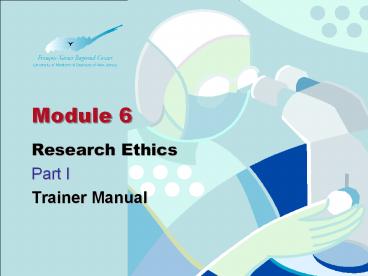Module 6 - PowerPoint PPT Presentation
1 / 26
Title:
Module 6
Description:
... the Fran ois-Xavier Bagnoud Center at the University of ... Claire Schuster, BS, MPH. Network Community Coordinator. Social & Scientific Systems, Inc. ... – PowerPoint PPT presentation
Number of Views:37
Avg rating:3.0/5.0
Title: Module 6
1
Module 6
- Research Ethics
- Part I
- Trainer Manual
2
This teaching tool was developed by the
François-Xavier Bagnoud Center at the University
of Medicine and Dentistry of New Jersey, with the
support of the International Maternal Pediatric
and Adolescent Clinical Trials (IMPAACT) network.
- Excerpts from this publication may be reproduced
or adapted with acknowledgement of the source,
provided the material reproduced by and for
non-profit distribution only.
Claire Schuster, BS, MPH Network Community
Coordinator Social Scientific Systems,
Inc. EMail cschuster_at_s-3.com (301) 628-3319 ?
Version 1.0 May 2007
3
Objectives
- After completing this training, participants will
be able to - Discuss the basic principles of research ethics.
- Explain the historical context for some of the
protections now in place for research
participants - Discuss special ethical concerns related to
vulnerable populations. - Describe ethical issues related to the process
of informed consent and assent.
4
Vocabulary
- Ethics a system of moral values correct
behavior - Vulnerable populations people who are at risk of
being unfairly influenced or of feeling unfair
pressure to join a study - Beneficence doing good
- Justice fairness
5
Vocabulary
- Informed consent the process of communicating
the information a volunteer needs to have before
deciding about participating in a clinical trial - Voluntary done willingly, without pressure or
reward - Risk-benefit ratio the risks of participating in
a study compared with the benefits - Recruitment inviting people to join a study
6
Basic Principles of Human Research Ethics
- Respect for persons
- Beneficence
- (doing good)
- Justice
- (fairness)
7
Respect for Persons
- The role of the health care professional is to
present all the facts about the research.
I am going to tell you about possible benefits of
this study, as well as the possible risks.
8
Informed Consent
- Why is the study being done?
- What are the medicines involved?
- Who will be in charge of my care during the
study? - Will my regular doctor or nurse also take care of
me? - What will be expected of me?
- What are the risks?
9
Informed Consent
- How might I benefit from this study?
- If I dont join the study, what other choice do I
have for my treatment? - Who will know about my participation?
- Who will see my research records?
- When the study ends, will I still get the
medicine if its helping me? - What will happen if I change my mind after
joining the study?
10
Discussion
- What steps should be taken to make sure that
informed consent is freely given by participants
and that participants are fully informed about
their choices?
11
Respect for Persons
- Vulnerable populations People who needspecial
protection - For example Women, children, minorities, the
mentally ill, people who dont have easy access
to healthcare, people who may need extra help
understanding the study, and people who are
overwhelmed with other problems or are very sick
12
Case Study
13
Beneficence(Doing good)
- The researchers must protect the participants
physical, mental and social well being. This
protection is more importantthan - The search for new knowledge
- The benefit to science
- The researchers personal interest
- in completing the study
14
Justice (fairness)
- Risks and benefits are carefully explained
- Eligibility criteria and recruitment methods are
fair - Special protection is provided for vulnerable
groups
15
Principles of Research Ethics
- How do we know that the principles of respect for
persons, beneficence, and justice are followed? - Do all researchers automatically behave
ethically?
16
The Nuremberg Code
- During WW II, Nazi doctors performed experiments
on concentration camp prisoners.
17
Nuremberg Code (1947)
- All of the experiments were conducted with
unnecessary suffering and injury and very little,
if any, precautionsto protect or safeguard the
human subjects from injury, disability, or
death. In every one of the experiments the
subjects experienced extreme pain or torture, and
in most of them they suffered permanent injury,
mutilation, or death...
18
The Nuremberg Code
- Informed consent is essential.
- There must be a good risk-benefit ratio more
benefits for the participant than risks. - Researchers must be well-trained and must use an
appropriate research design. - Participants must be free to leave the study at
any time.
19
The Declaration of Helsinki 1964
- This declaration added some new rules to the
Nuremberg Code. - States that researchers cannot use placebos if
effective methods exist for treatment or
prevention.
20
The Belmont Report 1974-1979
- Research with human subjects in the United States
- Independent committees to review research
protocol - 3 fundamental ethical principles respect for
persons, beneficence, justice
21
U.S. ResearchImproper Conduct
- Tuskegee 1932-1972
- Observation of the long-term effects of syphilis
- Intentionally withheld treatment from 399
impoverished African-American men
22
U.S. ResearchImproper Conduct
- Willowbrook 1963-1966
- Willowbrook State School
- Children were deliberately infected with
hepatitis virus in order to observe the natural
course of the disease
23
The National Research Act of 1974
- The National Research Act of 1974
- Establish Institutional Review Boards (IRBs) or
Ethics Committees - Created the National Commission for the
Protection of Human Subjects. - The Belmont Report (1979)
- Respect for persons
- Beneficence (maximize benefit and minimize harm)
- Justice (fair selection of participants)
24
NBAC Statement
- Research in resource-poor countries must
- Meet local needs
- Include communityinvolvement (CAB!!)
- Include placebo only if there is a
- good reason
- Benefits must be available to all
- Informed consent must fit the culture
25
Summary
26
Case Study































